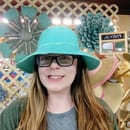My experience with play-acting began with the Scooby Doo mysteries. In kindergarten, I went to a private school in the suburbs. Every recess our group of girls broke loose on the playground. While in the classroom, we followed strict rules. We colored pictures when the teachers told us to, took naps at the allotted time, shared toys with others, and spoke politely. When the recess doors were thrown open, it was every kid for themselves. I had been joined at the hip to a small group of girls since my first day of school. Every recess we had a tradition of running into the school’s backyard, past the jungle gyms filled with the boys. There we sat down in the grass and pretended to be the characters from the Scooby Doo cartoons. All of the girls were Daphne, which could get confusing. However, we made up our own stories and played along. The other girls agreed that there must be a male character. Before I could call out that I wanted to be Daphne, I was given the role of Shaggy. It was bestowed upon me so that I would think I was important.
The first time this happened I didn’t think much of it. After the fourth day in a row, Shaggy became my playground enemy. I began to see the difference between the other girls and me. All of my friends had blonde hair and a petite build. They were shorter than all of the boys and never played with them. I was a quiet, dark-haired, pale little kid. I was one of the tallest children in the class. I had no hesitations about playing with and becoming friends with the boys on the playground. They liked having me around and I didn’t see a difference between interacting with them and the girls. My friends were deaf to my complaints. I was kind at first, asking why one of them couldn’t switch roles with me just once. They refused. Once when I asked again, I had to be Velma instead. I liked Velma, so I didn’t object. Now I see this gesture as a slight somehow, that I couldn’t be Daphne along with everyone else. I might as well have gone back to being Shaggy.
It was a rule as a kindergartener that one must have friends at recess. I was suddenly faced with the possibility of not having any. My price to staying with my friends was to “always play the boy.” Society has promoted the idea of young children making friends as an essential learning experience. I felt pressured to keep my friends so I complied with their request. This crushing pattern of “always playing the boy” continued into high school. I had been told at least three times in school that I looked like Harry Potter. It didn’t seem to matter that I was a girl. These comments led me to believe that I wasn’t considered pretty, attractive, or feminine. I still believed that having friends was a human necessity, the same as water to drink and air for my lungs. I was viewing it more as a social obligation instead of something that I should want to do.
A change occurred in high school when I auditioned for the school play. The day of auditions was filled with anxiety. I remember being more nervous to audition than actually performing. When I went to check the list of who was in the production, my name was there. I was playing two roles, that of Ares and a cyclops. At that moment I felt no pride. I saw myself as the awkward, clumsy, graceless girl I had been since kindergarten. I was already lacking in self-confidence and now I would have to dance around the stage in an ugly beast’s costume.
The first week of play practice was surprising. There were only a small number of boys who auditioned for our Greek mythology play, so some of the girls would have to play male roles. Also, I learned that our assigned roles were not set in stone. As soon as I heard that from the director, I decided that I would “pick myself up by my bootstraps” as my grandfather always said. I was always on time for practice and my eagerness impressed those around me. I made it clear early on that I was dissatisfied with the roles that I had been given. Later on, it was decided that I would play one of the leads. I was cast as the vivacious and confident Hera, queen of the gods. No one was more shocked than me.
My reading skills came in handy. I had read Greek literature in my spare time and I helped the other actors learn their lines. We all ended up having to play multiple roles, but I relished the chance to become the elegant Hera. The one moment that sticks out to me is the first costume fitting. I never wore dresses, but as Hera I did. With the white Greek dress and a full face of make-up on, no one in the cast recognized me. No one that night mistook me for a boy. I was playing the part of a loud, occasionally egotistical goddess, but I felt empowered. I have always been proud of my gender and finally people were letting me embrace that.



